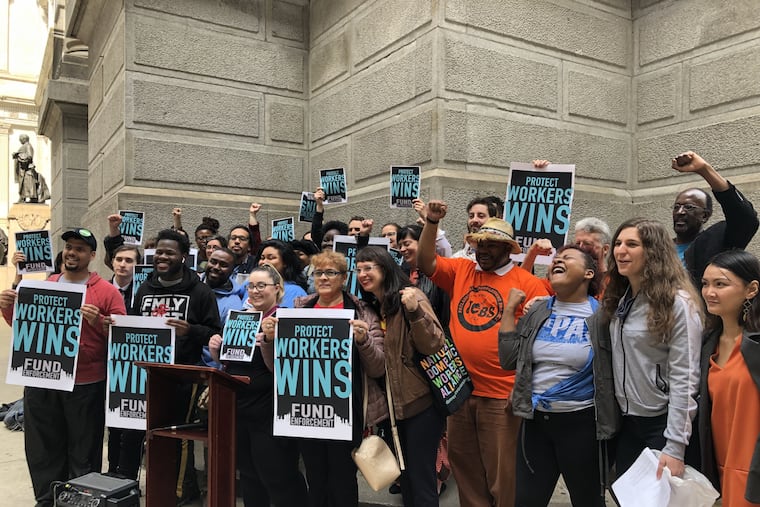7 groups chased Council members around City Hall to make a plea for more labor enforcement funding
Advocates have come together to push for more funding for the city's tiny and, so far, largely ineffective labor enforcement office.

>> UPDATE: Low-wage workers score win with bump in funding to enforce labor laws
The advocates were explaining the anti-wage-theft law to Venise Whitaker, City Council President Darrell L. Clarke’s constituent services staffer, when they got the word.
Squilla’s out there.
Let’s go. Now!
The group of nine workers and organizers quickly shuffled out of Clarke’s office as Devan Spear, executive director of the labor group Philadelphia Jobs With Justice, bounded down the third floor of City Hall to get Councilman Mark Squilla’s attention.
Squilla, clutching a Dunkin’ iced coffee and an open, empty cardboard box, was on the phone and late for a meeting, but, he said, he had a moment to hear them out about the city’s labor enforcement office. The office has gained increasing importance as the city has passed more worker-protection laws in the last several years.
We want to talk to you about getting more money for the office in this upcoming budget, they said: $100,000.
“That’s it?”
We’ll be back for more next year, they assured him.
Squilla, who introduced a mayoral bill last fall to raise the minimum wage for city workers, contractors, and subcontractors to $15 an hour, was on board. Now the advocates just had to get all the other Council members, too.
On Tuesday morning, representatives from at least seven advocacy groups came together to lobby City Council for more money for enforcement of the city’s worker protection laws, such as:
The recently passed “Fair Workweek” scheduling law for food service, retail, and hotel workers.
Paid sick leave.
“Ban the Box," which makes it illegal for employers to ask about criminal records during a job interview.
Philadelphia, following a national trend of using worker-protection laws to fight poverty, has passed these measures, but most workers don’t know about their rights or where to go if those rights have been violated. The city has a three-person labor enforcement office housed in the Mayor’s Office that is only starting to make headway — and that’s where the advocates have set their sights, leading to such unlikely chants as: “What do we want?” “Enforcement!” “And when do we want it?” “Now!”
In three years, from 2016 to 2018, the city received 24 complaints about employers stealing wages from their workers and 43 complaints about employers not giving their workers mandated paid sick leave. (By comparison, Seattle’s Office of Labor Standards, considered one of the national leaders in this sort of enforcement, resolved 76 paid sick leave investigations and 62 wage-theft investigations in 2018 alone. That year, its office employed 23 people.)
“It’s time for the city to put their money where their mouth is," said Calvin Okunoye, a former chef who works as a coordinator for the worker-focused Restaurant Opportunities Center of Philadelphia.
For many of those at the event Tuesday morning, this campaign is high-stakes: They’re advocating for the enforcement of laws they fought to get passed or hope to get passed, as is the case with the Pennsylvania Domestic Workers Alliance, which is working with Council on a “bill of rights” to win protections for domestic workers such as house cleaners and nannies. The Fair Workweek law will go into effect in 2020, and without adequate resources for enforcement, organizers worry the law won’t serve workers in the way in which it was designed.
It’s also a sign of the times in worker organizing. In the past, advocates might have trusted the city to enforce these laws on its own, but now they’re making it a priority to pressure the city to do so, and as a collective, instead of working separately.
While the advocacy groups were angling for a modest budget increase this time around, they have a broader vision for the future of the office: a worker advisory board, grants to community organizations that are already doing worker outreach, and potentially making the enforcement office independent of the Mayor’s Office in order to ensure the enforcement work is prioritized even if a future mayor doesn’t support it.
Mayor Jim Kenney has proposed a more than $250,000 increase in the enforcement office’s budget for 2020 to cover the cost of Fair Workweek implementation. The proposed budget — nearly $996,000 — would allow for the hiring of two more staffers, including one specifically focused on education and outreach. But there’s no budget line for materials to do that outreach, such as ads or mailers, which is why the advocates were pressing Council to increase the proposed budget by $100,000.
The response from the Council members the group approached was much like Squilla’s: It’s not a big ask.
“I don’t see why not,” said Councilman David Oh, who said he’d vote to approve the increase.
Andre del Valle, legislative assistant to Councilwoman Maria Quiñones-Sánchez, said that it was a “drop in the bucket" and that Quiñones-Sánchez’s office would commit to finding a way to make the numbers work.
Council is slated to vote on the mayor’s budget in June but can recommend changes to the mayor before the vote.
Philadelphia Media Network is one of 21 news organizations producing Broke in Philly, a collaborative reporting project on solutions to poverty and the city’s push toward economic justice. See all of our reporting at brokeinphilly.org.